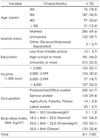Abstract
This study compared levels of health and dietary behavior practices and health beliefs according to the stage of weight loss behavior change of Korean male workers. A self-administered survey questionnaire was collected from 411 male adult workers residing in Seoul, Kyeonggi, Chungcheong region. Practices of health related behavior, including smoking, drinking, exercise, work related physical activity, and dietary behavior according to dietary guidelines were evaluated. In addition, the levels of perceived benefit, perceived barrier, perceived susceptibility, perceived seriousness, and perceived cue to action from the health belief model were measured according to the stages of weight loss behavior change. Significant differences in BMI, level of daily exercise, and practices of dietary behavior according to dietary guidelines were observed among stages of weight loss behavior change. Subjects who were in action/maintenance stage showed a more desirable level of health behavior and health belief model variables, except perceived barrier. Based on the findings of this study, it is suggested that subjects with different stages of behavior change need an appropriate specific nutrition education method and material for improvement of nutrition education efficacy.
Figures and Tables
References
1. World Health Organization. Obesity: preventing and managing the global epidemic. Report of a WHO consultation on obesity. Geneva: World Health Organization;1997.
2. Ministry of Health and Welfare, Korea Centers for Disease Control and Prevention. Korea Health Statistics 2011: Korea National Health and Nutrition Examination Survey (KNHANES V-2). Cheongwon: Korea Centers for Disease Control and Prevention;2012.
3. Park JA, Yoon JS. Dietary behaviors and status of nutrient intakes by the obesity levels of housewives in Daegu. Korean J Community Nutr. 2005; 10(5):623–632.
5. Son KM, Kim YH, Park SR. The relationships between transtheoretical model and health belief model to explain exercise behavior. Korean J Phys Educ. 2009; 48(6):163–173.
6. Ahn Y, Kim KW. Beliefs regarding vegetable consumption, self-efficacy and eating behaviors according to the stages of change in vegetable consumption among college students. Korean J Community Nutr. 2012; 17(1):1–13.

7. Prochaska JO, DiClemente CC. Stages and processes of self-change of smoking: toward an integrative model of change. J Consult Clin Psychol. 1983; 51(3):390–395.

8. Choi MY, Kim HY. Nutrition knowledge, dietary self-efficacy and eating habits according to student's stage of regular breakfast or exercise. Korean J Community Nutr. 2008; 13(5):653–662.
10. Choi NH, Ahn HS, Lee S. Comparison of health belief levels and health behavior practices according to lifestyle among adults residing in Seoul. Korean J Community Nutr. 2011; 16(6):683–696.

11. Jang SH, Yang SJ, Kim SJ. Physical activities and health belief of elementary school students for obesity prevention and management among elementary school students. J Korean Acad Public Health Nurs. 2012; 26(2):227–238.
12. Hong SW, Lim MT. The causes of obesity and difficulties caused by obesity in elementary students. Korean J Elem Phys Educ. 2009; 15(2):61–74.
13. Lee YA, Kim KN, Chang N. The effect of nutrition education on weight control and diet quality in middle-aged women. Korean J Nutr. 2008; 41(1):54–64.
14. Bae YJ. Evaluation of nutrient and food intake status, and dietary quality in Korean female adults according to obesity: based on 2007-2009 Korean National Health and Nutrition Examination Survey. Korean J Nutr. 2012; 45(2):140–149.
15. Lee YM. Process of change, decisional balance and self efficacy corresponding to stages of change in exercise behaviors in middle aged women. J Korean Acad Nurs. 2004; 34(2):362–371.

16. Oh SY, Cho MR, Kim JC, Cho YY. Comparison of nutritional status and beliefs on health behavior regarding stages of change in dietary fat reduction among Korean men and women. Korean J Nutr. 2001; 34(2):222–229.
17. Kim YO. Weight control behaviors among Korean adults: association with dietary intake. J Korean Soc Food Sci Nutr. 2002; 31(6):1018–1025.
18. Kim CG. Effect of health behavior and obesity indices on blood pressure in 20s man. J Korea Contents Assoc. 2011; 11(8):231–238.

19. Jang HS, Choi JH. The health status according to the age and BMI of male workers in Daegu, Gyeongbuk region. J Korean Soc Food Sci Nutr. 2007; 36(3):318–326.
20. Ministry of Health and Welfare. Korea Health Industry Development Institute. Eating behavior guidelines for adult group. Cheongwon: Korea Health Industry Development Institute;2003.
21. Kim YI, Kim SL, Jung HS, Kim SY, Park HJ. Workers' health belief in health promotion programs and related factors. J Korean Acad Community Health Nurs. 2009; 20(4):465–473.




 PDF
PDF ePub
ePub Citation
Citation Print
Print









 XML Download
XML Download